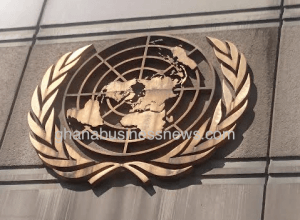UN calls for partnership to build data on girl-child
 The United Nations (UN) has urged Governments and development partners to work with UNICEF’s “Global Girl Data Movement” to address gender gaps in data collection, analysis, dissemination and use, to ensure that no girl is left behind in socio-economic and environmental development.
The United Nations (UN) has urged Governments and development partners to work with UNICEF’s “Global Girl Data Movement” to address gender gaps in data collection, analysis, dissemination and use, to ensure that no girl is left behind in socio-economic and environmental development.
It said adequate and quality data would provide the basis for holding all stakeholders – including governments, communities and development partners – accountable for investing in making sure that girls had an equal chance to succeed, live healthy lives, realise their dreams and contribute to their societies.
Ms. Emelia Allan, a Child Protection Specialist at the United Nations Children’s Fund (UNICEF), made the call in her address at a media briefing in Accra, on Monday, to give highlights on the upcoming activities to commemorate the 2016 International Day of the Girl-Child.
She said the Day was instituted by the UN General Assembly, and it was marked annually on October 11 to create the platform for advocacy to ensure that girls get the investment and recognition they deserve as citizens and as powerful agents of change within their own families, communities and nations.
It also focuses on promoting girls’ empowerment and highlights the unique challenges they face around the world in areas such as child marriage, teenage pregnancy, child labour, violence, discrimination, gender inequality and limited access to education and health.
Ms Allan said the national theme is: “The Relevance of Data in tracking Developmental Progress”, which focuses on the importance of data in highlighting the challenges and opportunities faced by girls in their daily lives.
She said investment in data was necessary to be able to measure and understand the opportunities and challenges girls faced; and it was also important to inform the interventions to be made by Governments and development partners.
It would also help to track the progress towards meeting the most pressing needs of girls.
Ms Allan said although a lot was being done to address the numerous challenges faced by girls and close the gender gap, inadequate data, braced with ethical challenges associated with collecting such statistics from target groups, including young people, had made the process very stressful.
She said the Sustainable Development Goals (SDGs) was expected to transform national and local development efforts throughout the world in a commitment to leave no one behind in economic, social and environmental development.
“However, in order to assess, monitor and communicate the wellbeing and progress of girls we need age and sex disaggregated data, as advocated for the Global Strategy for Women, Children and Adolescents’ Health (2016-2030),” she said.
She urged the media to intensify advocacy and education on the need for improved access to girl-child education, health and other basic needs, and to highlight their contributions to society and the world at large.
Mrs Cynthia Prah, the National Information Officer of the United Nations Information Centre, said a UN Gender Team had been instituted as a focal point to project the issues for change.
She said the UN was providing support to a number of Non-governmental Organisations to organise activities such as public forums and outreach programmes to highlight the theme and address some of the issues.
Source: GNA
